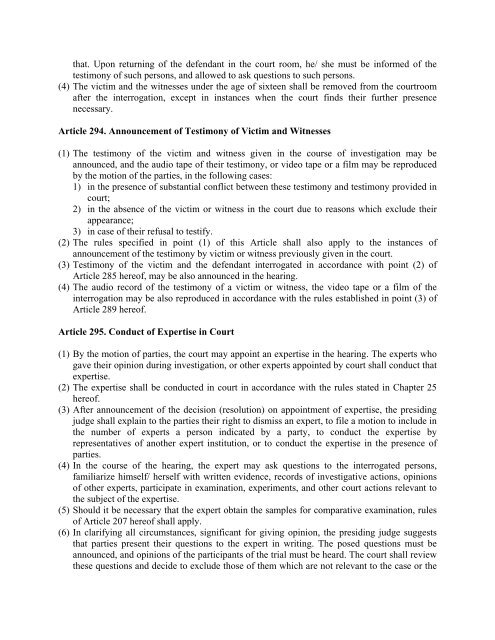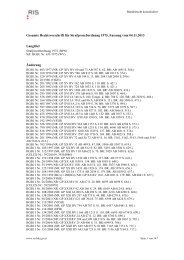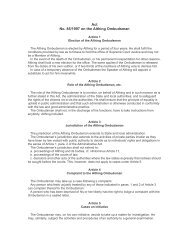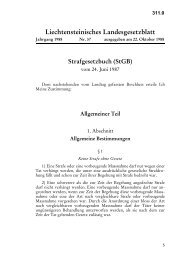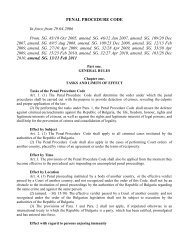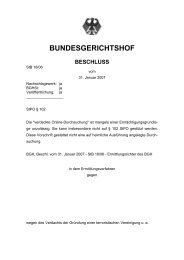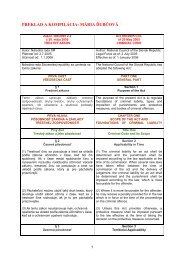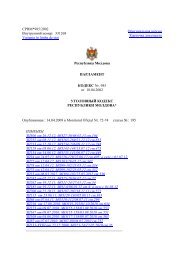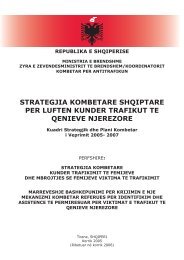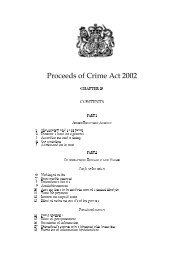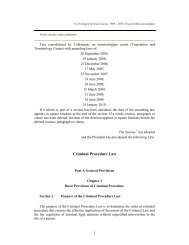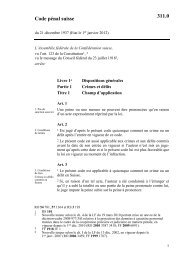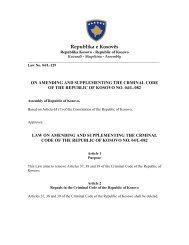Criminal Procedure Code of the Kyrgyz Republic - Legislationline
Criminal Procedure Code of the Kyrgyz Republic - Legislationline
Criminal Procedure Code of the Kyrgyz Republic - Legislationline
Create successful ePaper yourself
Turn your PDF publications into a flip-book with our unique Google optimized e-Paper software.
that. Upon returning <strong>of</strong> <strong>the</strong> defendant in <strong>the</strong> court room, he/ she must be informed <strong>of</strong> <strong>the</strong><br />
testimony <strong>of</strong> such persons, and allowed to ask questions to such persons.<br />
(4) The victim and <strong>the</strong> witnesses under <strong>the</strong> age <strong>of</strong> sixteen shall be removed from <strong>the</strong> courtroom<br />
after <strong>the</strong> interrogation, except in instances when <strong>the</strong> court finds <strong>the</strong>ir fur<strong>the</strong>r presence<br />
necessary.<br />
Article 294. Announcement <strong>of</strong> Testimony <strong>of</strong> Victim and Witnesses<br />
(1) The testimony <strong>of</strong> <strong>the</strong> victim and witness given in <strong>the</strong> course <strong>of</strong> investigation may be<br />
announced, and <strong>the</strong> audio tape <strong>of</strong> <strong>the</strong>ir testimony, or video tape or a film may be reproduced<br />
by <strong>the</strong> motion <strong>of</strong> <strong>the</strong> parties, in <strong>the</strong> following cases:<br />
1) in <strong>the</strong> presence <strong>of</strong> substantial conflict between <strong>the</strong>se testimony and testimony provided in<br />
court;<br />
2) in <strong>the</strong> absence <strong>of</strong> <strong>the</strong> victim or witness in <strong>the</strong> court due to reasons which exclude <strong>the</strong>ir<br />
appearance;<br />
3) in case <strong>of</strong> <strong>the</strong>ir refusal to testify.<br />
(2) The rules specified in point (1) <strong>of</strong> this Article shall also apply to <strong>the</strong> instances <strong>of</strong><br />
announcement <strong>of</strong> <strong>the</strong> testimony by victim or witness previously given in <strong>the</strong> court.<br />
(3) Testimony <strong>of</strong> <strong>the</strong> victim and <strong>the</strong> defendant interrogated in accordance with point (2) <strong>of</strong><br />
Article 285 here<strong>of</strong>, may be also announced in <strong>the</strong> hearing.<br />
(4) The audio record <strong>of</strong> <strong>the</strong> testimony <strong>of</strong> a victim or witness, <strong>the</strong> video tape or a film <strong>of</strong> <strong>the</strong><br />
interrogation may be also reproduced in accordance with <strong>the</strong> rules established in point (3) <strong>of</strong><br />
Article 289 here<strong>of</strong>.<br />
Article 295. Conduct <strong>of</strong> Expertise in Court<br />
(1) By <strong>the</strong> motion <strong>of</strong> parties, <strong>the</strong> court may appoint an expertise in <strong>the</strong> hearing. The experts who<br />
gave <strong>the</strong>ir opinion during investigation, or o<strong>the</strong>r experts appointed by court shall conduct that<br />
expertise.<br />
(2) The expertise shall be conducted in court in accordance with <strong>the</strong> rules stated in Chapter 25<br />
here<strong>of</strong>.<br />
(3) After announcement <strong>of</strong> <strong>the</strong> decision (resolution) on appointment <strong>of</strong> expertise, <strong>the</strong> presiding<br />
judge shall explain to <strong>the</strong> parties <strong>the</strong>ir right to dismiss an expert, to file a motion to include in<br />
<strong>the</strong> number <strong>of</strong> experts a person indicated by a party, to conduct <strong>the</strong> expertise by<br />
representatives <strong>of</strong> ano<strong>the</strong>r expert institution, or to conduct <strong>the</strong> expertise in <strong>the</strong> presence <strong>of</strong><br />
parties.<br />
(4) In <strong>the</strong> course <strong>of</strong> <strong>the</strong> hearing, <strong>the</strong> expert may ask questions to <strong>the</strong> interrogated persons,<br />
familiarize himself/ herself with written evidence, records <strong>of</strong> investigative actions, opinions<br />
<strong>of</strong> o<strong>the</strong>r experts, participate in examination, experiments, and o<strong>the</strong>r court actions relevant to<br />
<strong>the</strong> subject <strong>of</strong> <strong>the</strong> expertise.<br />
(5) Should it be necessary that <strong>the</strong> expert obtain <strong>the</strong> samples for comparative examination, rules<br />
<strong>of</strong> Article 207 here<strong>of</strong> shall apply.<br />
(6) In clarifying all circumstances, significant for giving opinion, <strong>the</strong> presiding judge suggests<br />
that parties present <strong>the</strong>ir questions to <strong>the</strong> expert in writing. The posed questions must be<br />
announced, and opinions <strong>of</strong> <strong>the</strong> participants <strong>of</strong> <strong>the</strong> trial must be heard. The court shall review<br />
<strong>the</strong>se questions and decide to exclude those <strong>of</strong> <strong>the</strong>m which are not relevant to <strong>the</strong> case or <strong>the</strong>


